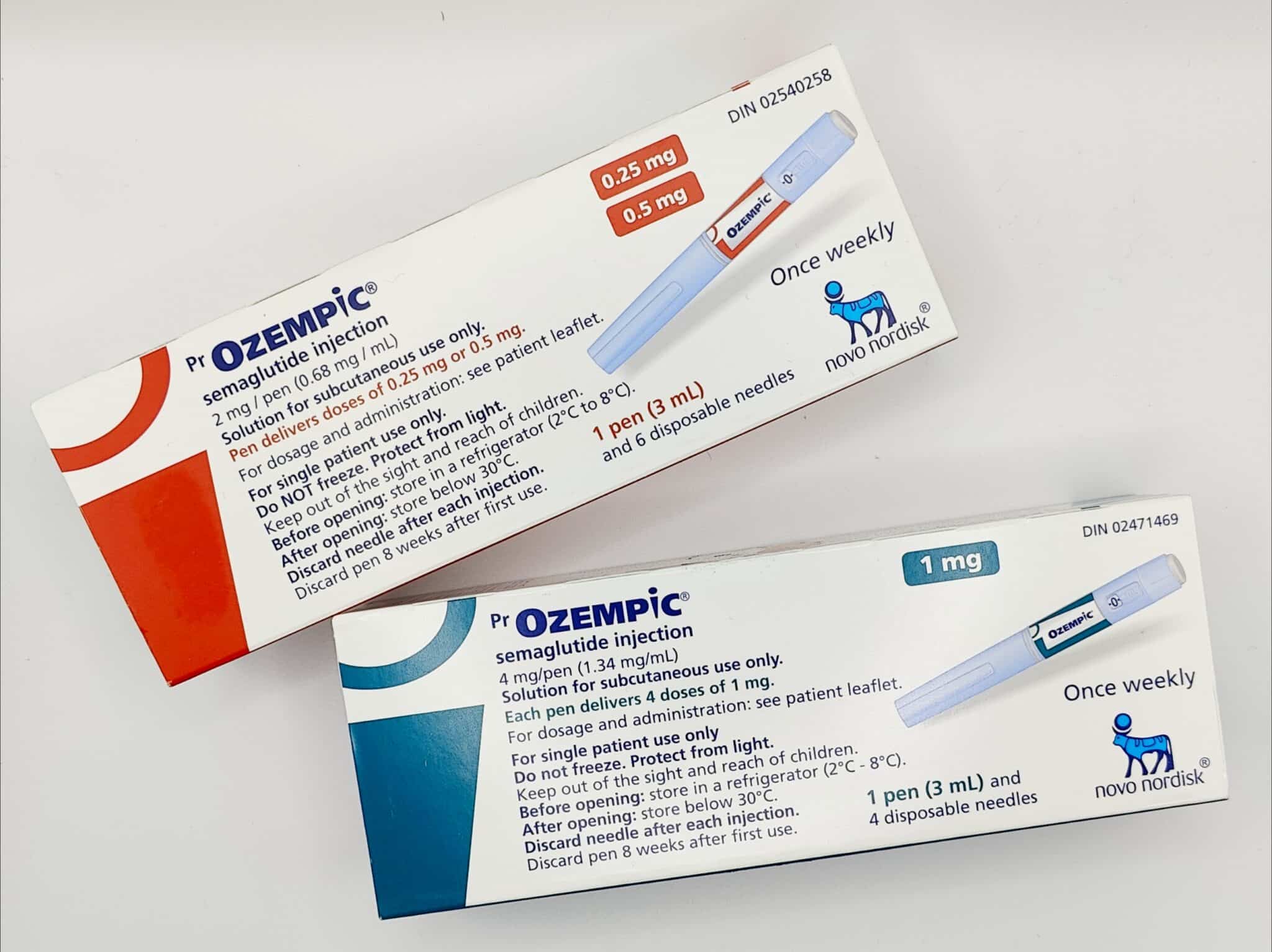Peptides for Weight Loss vs. Ozempic and Mounjaro: What’s the Better Choice?
Peptides for Weight Loss vs. Ozempic and Mounjaro: What’s the Better Choice?
- Jason K
The search for effective weight loss treatments has led to growing interest in two options: peptides and well-established medications like Ozempic (semaglutide) and Mounjaro (tirzepatide). While both approaches can help individuals lose weight, they differ in their mechanisms, safety profiles, and effectiveness. This article explores how peptides stack up against Ozempic and Mounjaro, helping you decide which might be the better choice for your weight loss journey.
What Are Peptides?
Peptides are short chains of amino acids that act as signaling molecules in the body. Certain peptides are designed to target fat metabolism, muscle growth, and appetite regulation. Common weight loss peptides include:
- CJC-1295: Stimulates growth hormone release, promoting fat loss and muscle retention.
- Ipamorelin: Often used with CJC-1295, this peptide enhances growth hormone secretion.
- AOD-9604: Derived from human growth hormone, it specifically targets fat breakdown.
Peptides primarily work by boosting metabolic processes and encouraging the body to use stored fat as energy, resulting in gradual weight loss.
What Are Ozempic and Mounjaro?
Ozempic and Mounjaro are injectable medications initially developed for Type 2 diabetes management. They’ve since gained recognition for their ability to promote effective and sustained weight loss, making them popular choices for individuals managing obesity.
Ozempic (semaglutide): A GLP-1 receptor agonist that suppresses appetite and slows gastric emptying, helping patients feel fuller longer. Studies show it can lead to 10–15% weight loss when paired with lifestyle changes.
Mounjaro (tirzepatide): A dual-action medication targeting both GLP-1 and GIP receptors, making it even more effective for weight loss. Clinical trials show up to 20% body weight reduction in some patients, setting it apart from other options.
Both medications are highly effective, offering significant benefits for both weight loss and metabolic health.
Mechanism of Action: Peptides vs. Ozempic and Mounjaro
Peptides:
Peptides enhance metabolism by:
- Stimulating growth hormone production, which accelerates fat breakdown.
- Supporting muscle retention, which helps maintain a healthy metabolic rate.
Ozempic and Mounjaro:
These medications regulate appetite and glucose metabolism by:
- Activating GLP-1 receptors (and GIP receptors for Mounjaro) to suppress hunger.
- Slowing gastric emptying, which reduces calorie intake.
- Improving insulin sensitivity, reducing fat storage.
Key Difference:
Peptides focus on metabolic enhancement, while Ozempic and Mounjaro directly target appetite and calorie consumption, making them more effective for significant weight loss.
Effectiveness: What Does the Research Say?
Peptides:
- Weight loss results with peptides vary widely. While peptides like CJC-1295 and AOD-9604 show promise in reducing body fat, the effects are often modest unless combined with strict diet and exercise.
- Peptides are more suited for those looking to improve body composition rather than achieving substantial weight loss.
Ozempic and Mounjaro:
- Clinical studies have demonstrated significant weight loss with both Ozempic and Mounjaro:
- Patients taking Ozempic can lose 10–15% of their body weight over several months.
- Mounjaro outperforms Ozempic, with some studies showing weight loss of up to 20%.
- These results are consistent across diverse patient populations, making them more reliable for individuals with obesity.
Key Difference:
Ozempic and Mounjaro provide more predictable and substantial weight loss compared to peptides, particularly for individuals with obesity.
Safety Profiles
Peptides:
- Peptides are generally well-tolerated, with mild side effects such as fatigue, headaches, or localized irritation at the injection site.
- However, long-term safety data for weight loss peptides are limited, and quality can vary depending on the supplier.
Ozempic and Mounjaro:
- Common side effects include nausea, vomiting, and gastrointestinal discomfort, especially when starting treatment.
- These medications have well-established safety profiles backed by extensive clinical research.
Key Difference:
Ozempic and Mounjaro have more robust safety data, while peptides are less studied for long-term use.
Convenience and Administration
Peptides:
- Administered via subcutaneous injections, often requiring daily or multiple weekly doses.
- Storage and handling can be inconvenient for some users.
Ozempic and Mounjaro:
- Administered as a weekly injection, making them far more convenient for long-term use.
- Pre-filled pens simplify the process and reduce the risk of dosing errors.
Key Difference:
Ozempic and Mounjaro offer easier administration and less frequent dosing compared to peptides.
Cost Comparison
Peptides:
Peptides typically cost between $200 and $600 per month, depending on the specific type, dosage, and provider. These treatments are often considered experimental for weight loss, so they are not covered by insurance. This means most patients must pay the full cost out of pocket, adding to the financial burden.
Ozempic and Mounjaro:
In the U.S., Ozempic and Mounjaro can range from $800 to $1,200 per month. While these medications are frequently covered by insurance for individuals with Type 2 diabetes or obesity, uninsured patients often face high out-of-pocket costs.
For Americans seeking more affordable options, buying from Canadian pharmacies offers significant savings.
- Ozempic: Priced at $429.96 per pen from Canada, this can lead to savings of 40–50% compared to U.S. prices.
- Mounjaro: Starting at $615.96 per pen, Mounjaro remains more affordable from Canada, making it a cost-effective option for those managing both diabetes and weight loss for Americans.
Key Difference:
While peptides may appear less expensive upfront, they are often paid entirely out of pocket, with limited long-term data to support their effectiveness. In contrast, Ozempic and Mounjaro offer reliable weight loss results, and buying these medications from Canadian pharmacies can significantly reduce costs for uninsured or underinsured patients.
Which Is Right for You?
Choosing between peptides and Ozempic or Mounjaro depends on your weight loss goals, medical history, and budget.
Choose Peptides if:
- You’re looking to improve body composition rather than achieve major weight loss.
- You’re comfortable with daily injections and have a structured diet and exercise plan.
Choose Ozempic or Mounjaro if:
- You want significant weight loss with proven results.
- You’re managing obesity or related conditions like Type 2 diabetes.
- You prefer a user-friendly treatment with weekly dosing.
Conclusion
While peptides and medications like Ozempic and Mounjaro offer unique benefits, Ozempic and Mounjaro stand out as more effective and convenient options for achieving substantial weight loss. Their proven track records and established safety profiles make them the go-to choice for many individuals with obesity or diabetes.
If you’re considering these options, consult with your healthcare provider to determine the best approach for your needs. With the right treatment and lifestyle changes, achieving sustainable weight loss is possible.
Reference:


